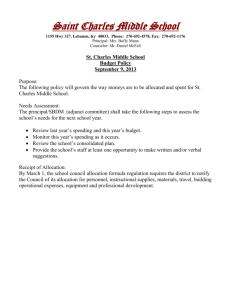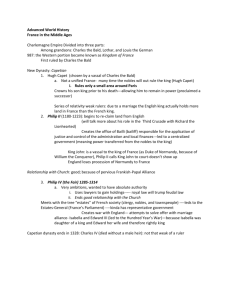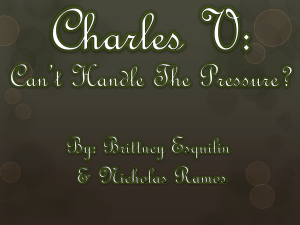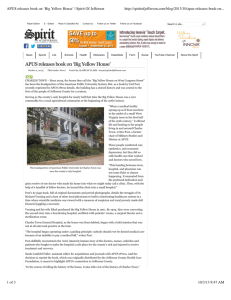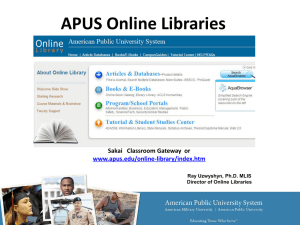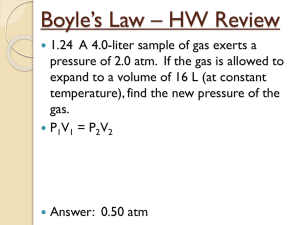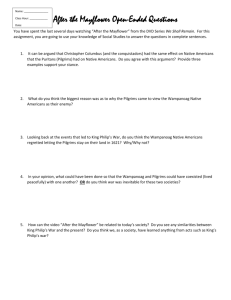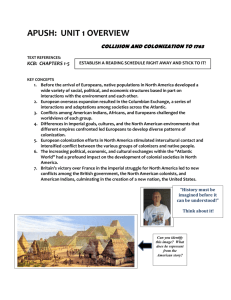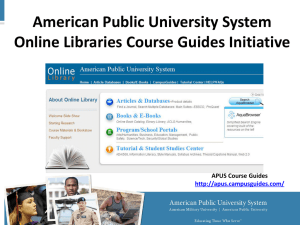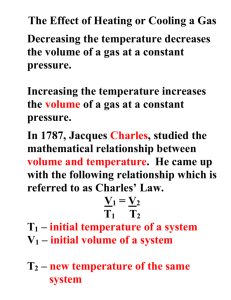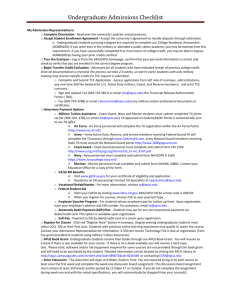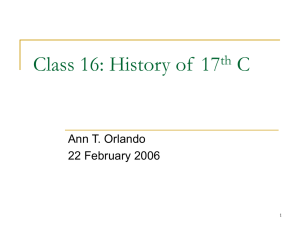AP US History Summer Assignment - Benedictine College Preparatory
advertisement
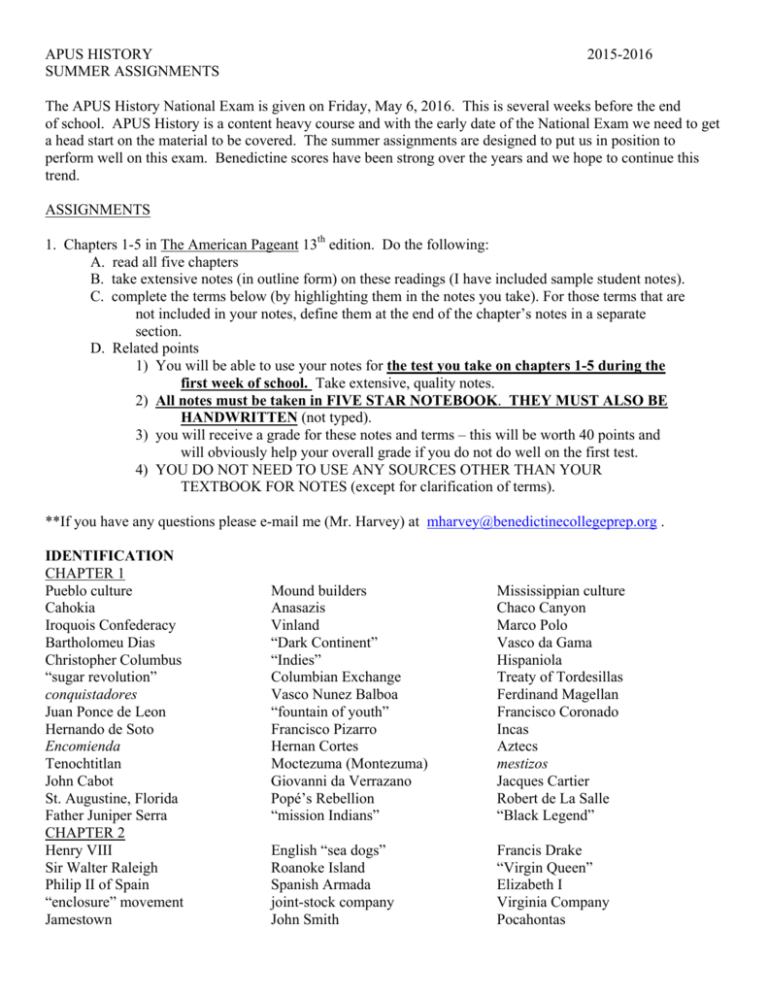
APUS HISTORY SUMMER ASSIGNMENTS 2015-2016 The APUS History National Exam is given on Friday, May 6, 2016. This is several weeks before the end of school. APUS History is a content heavy course and with the early date of the National Exam we need to get a head start on the material to be covered. The summer assignments are designed to put us in position to perform well on this exam. Benedictine scores have been strong over the years and we hope to continue this trend. ASSIGNMENTS 1. Chapters 1-5 in The American Pageant 13th edition. Do the following: A. read all five chapters B. take extensive notes (in outline form) on these readings (I have included sample student notes). C. complete the terms below (by highlighting them in the notes you take). For those terms that are not included in your notes, define them at the end of the chapter’s notes in a separate section. D. Related points 1) You will be able to use your notes for the test you take on chapters 1-5 during the first week of school. Take extensive, quality notes. 2) All notes must be taken in FIVE STAR NOTEBOOK. THEY MUST ALSO BE HANDWRITTEN (not typed). 3) you will receive a grade for these notes and terms – this will be worth 40 points and will obviously help your overall grade if you do not do well on the first test. 4) YOU DO NOT NEED TO USE ANY SOURCES OTHER THAN YOUR TEXTBOOK FOR NOTES (except for clarification of terms). **If you have any questions please e-mail me (Mr. Harvey) at mharvey@benedictinecollegeprep.org . IDENTIFICATION CHAPTER 1 Pueblo culture Cahokia Iroquois Confederacy Bartholomeu Dias Christopher Columbus “sugar revolution” conquistadores Juan Ponce de Leon Hernando de Soto Encomienda Tenochtitlan John Cabot St. Augustine, Florida Father Juniper Serra CHAPTER 2 Henry VIII Sir Walter Raleigh Philip II of Spain “enclosure” movement Jamestown Mound builders Anasazis Vinland “Dark Continent” “Indies” Columbian Exchange Vasco Nunez Balboa “fountain of youth” Francisco Pizarro Hernan Cortes Moctezuma (Montezuma) Giovanni da Verrazano Popé’s Rebellion “mission Indians” Mississippian culture Chaco Canyon Marco Polo Vasco da Gama Hispaniola Treaty of Tordesillas Ferdinand Magellan Francisco Coronado Incas Aztecs mestizos Jacques Cartier Robert de La Salle “Black Legend” English “sea dogs” Roanoke Island Spanish Armada joint-stock company John Smith Francis Drake “Virgin Queen” Elizabeth I Virginia Company Pocahontas “starving time” First Anglo-Powhatan War Second Anglo-Powhatan War House of Burgesses Act of Toleration (1649) Oliver Cromwell Lord Proprietors (Carolinas) “graveyard of the Atlantic” “charity colony” “soil butchery” Lord De La Warr Powhatan’s Confederacy “Irish tactics” John Rolfe tobacco (cash crop) King Nicotine Lord Baltimore St. Marys (Maryland) Barbados slave code King Charles I Restoration colonies King Charles II Willam Penn Charles Town North Carolina and South Carolina James Oglethorpe Savannah, Georgia John Wesley CHAPTER 3 Martin Luther Calvinism “visible saints” Separatists Plymouth Rock Massachusetts Bay Colony “a city upon a hill” “the Blue Law State” Roger Williams Fundamental Orders of Connecticut Squanto King Philip’s War (1675-76) Navigation Laws William and Mary Henry Hudson Patroonships Duke of York “Penn’s Woodland” City of Brotherly Love Protestant Reformation John Calvin predestination conversion Puritans King James I Mayflower Pilgrims Mayflower Compact William Bradford Great Migration John Winthrop Bible Commonwealth John Cotton “Day of Doom” (1662) Anne Hutchinson Rhode Island Thomas Hooker Hartford New Haven Mystic Massacre (1637) Metacom (King Philip) New England Confederation (1643) Dominion of New England Sir Edmund Andros Glorious Revolution (1688-89) “salutary neglect” Anglo-Dutch wars New Netherland New Amsterdam Peter Stuyvesant New Sweden Quakers William Penn Chief Tammany middle colonies CHAPTER 4 indentured servants Nathaniel Bacon slave codes FFVs Harvard College Half-Way Covenant “New England conscience” headright system Bacon’s Rebellion Gullah The Scarlet Letter William and Mary College Salem Witch Trials William Berkeley middle passage Stono Rebellion Nathaniel Hawthorne “jeremiad” “Yankee ingenuity” Scots-Irish Regulator Movement Anglican Church Jonathan Edwards Charles Wilson Peale Poor Richard’s Almanack “great wagon road” triangular trade Congregational Church George Whitefield Phillis Wheatley John Peter Zenger (freedom of press) CHAPTER 5 Pennsylvania Dutch Paxton Boys Molasses Act of 1733 the Great Awakening “old lights” and “New lights” Benjamin Franklin
